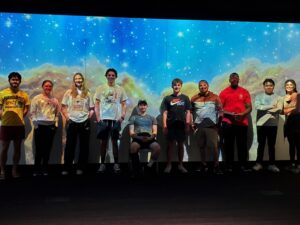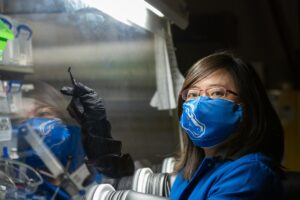CAES Research Experience for Undergraduates Begins!

Boise State University’s Center for Advanced Energy Studies Advanced Manufacturing for a Sustainable Energy Future Research Experience for Undergraduates welcomed participants in Boise May 22, 2023 to begin their cohort. The 10 participants explored the Stein Luminary Exhibit to see the INL builds, toured the BSU mentor’s labs, and explored downtown and campus. A welcome breakfast and orientation was held Wednesday, May 24, 2023 before the participants traveled to INL in Idaho Falls to begin lab training and working on their summer research projects.
We are very excited for our second year of this REU Cohort!
Boise State University Wins Three NSF Regional Innovation Engines Awards
New National Science Foundation projects underscore expanding partnerships with industry, agencies, and regional university partners
Boise State University is included in three $1 million awards from the U.S. National Science Foundation’s Regional Innovation Engines, or NSF Engines, program. Boise State researchers will be represented among 40 unique teams to receive the first-ever NSF Engines Development Awards, which aim to help partners collaborate to create economic, societal and technological opportunities for their regions.
Nancy Glenn, “Advancing Autonomous Systems Technologies in the Northern Front (North Dakota, South Dakota, Montana, Idaho)”
This project will expand Boise State’s expertise in autonomous vehicles, including unoccupied aerial systems (UAS) or drones, in both training and applications, in partnership with industry and network members. UAS applications range from infrastructure monitoring to natural resource management, geosciences, and beyond, along with expanding data science.
Lan Li, “Advancing Quantum and Supporting Technologies in the Northern Intermountain States (Montana, Wyoming, Idaho)”
This project is to establish a network of quantum computing and information systems, called the Quantum Capacity, Operational Resilience and Equity (QCORE) in a three-state region (Montana, Wyoming, and Idaho). Boise State will collaborate with Montana State University, University of Wyoming, and local industry partners to enhance economic development, research innovation, and workforce development in the field of quantum computing and information.
David Estrada, “Advancing Semiconductor Technologies in the Northwest (Oregon, Idaho, Washington)”
Aligned to the White House Office of Science and Technology’s National Strategy for Advanced Manufacturing, this project includes federal, regional and state government bodies, private industry and public learning institutions to develop a regional innovation ecosystem that expands discovery and entrepreneurship for the semiconductor industry. Partnerships with academic institutions and nonprofit organizations will also advance pathways for careers in semiconductor manufacturing.
Idaho Awarded $24 Million to Study Future Energy, Water Use in State
Idaho researchers will receive $24 million for a new research project on the impacts of changes in climate, population and technology on energy and water use in Idaho. The funding comes through a $20 million five-year award from the National Science Foundation (NSF) Established Program to Stimulate Competitive Research (EPSCoR), with the state of Idaho contributing an additional $4 million.
Researchers from Boise State University, University of Idaho, Idaho State University, the Coeur d’Alene Tribe and the Shoshone Bannock Tribes are leading the award in collaboration with utility companies, state and federal government agencies and Idaho cities and counties. Researchers will work to identify energy and water use strategies that will be resilient to Idaho’s changing needs, based on ongoing feedback from communities.
“We’re eager to advance energy and water decision making by integrating local knowledge more fully with machine learning and other methods to understand resilience,” said Kathy Araújo, Director of the Energy Policy Institute, the policy arm for the Center for Advanced Energy Studies, Associate Professor at Boise State University and a project principal investigator. “This award will enable communities to make more informed choices about how they manage energy and water use as well as the systems and workforce that support such use.”
Xiong to Advance Sodium Ion Battery Technology with Office of Naval Research Grant

When we place a battery into a child’s remote control car, we know that there is a positive (+) symbol at one end and a negative (-) symbol at the other. The positive end of the battery holds the cathode. Typically, cathodes are a limiting factor of how densely energy can be packed into a rechargeable battery. But what if the processes and materials around the cathode could be changed to function differently, and expand how much energy a rechargeable battery can hold?
That is what Boise State Associate Professor Hui (Claire) Xiong from the Micron School of Materials Science and Engineering, and Center for Advanced Energy Studies Affiliate, is attempting to do. The research is in partnership with Professor Yan-Yan Hu from the Chemistry and Biochemistry Department at Florida State University and is supported by a three-year grant of $531,005 from the Office of Naval Research.
Full Article about Claire Xiong
Follow us on Social Media!
- Instagram: @boisestatecaes
- Twitter: @boisestateCAES
- Handshake: Boise State CAES
- LinkedIn: Boise State CAES
Contact Information:
- Email: caes@boisestate.edu
- (208) 426-6164
- 1910 University Drive, Mail Stop 2091, Boise, ID 83725-2091
- To Subscribe to the CAES Newsletter, email us at: caes@boisestate.edu